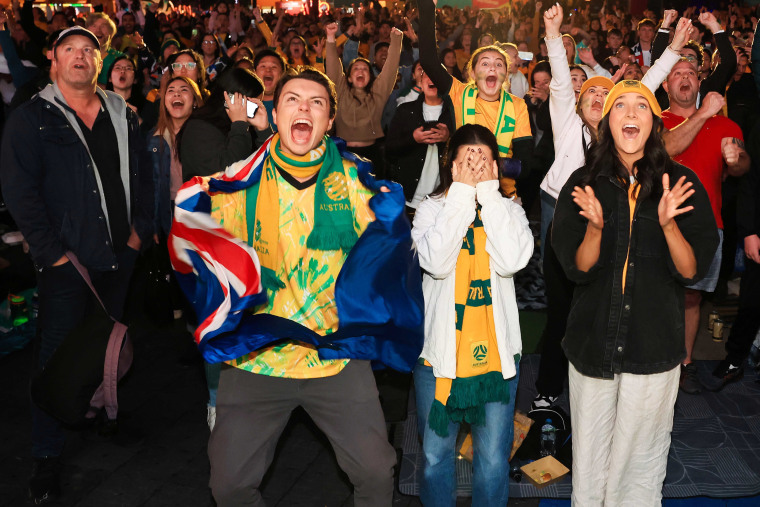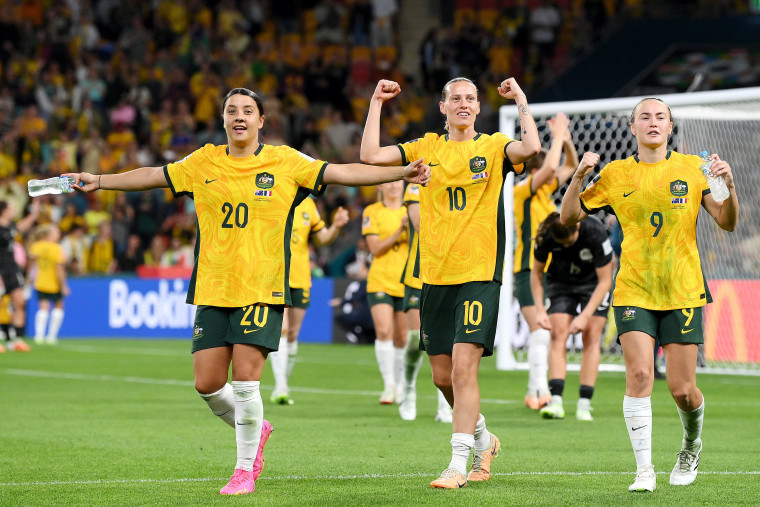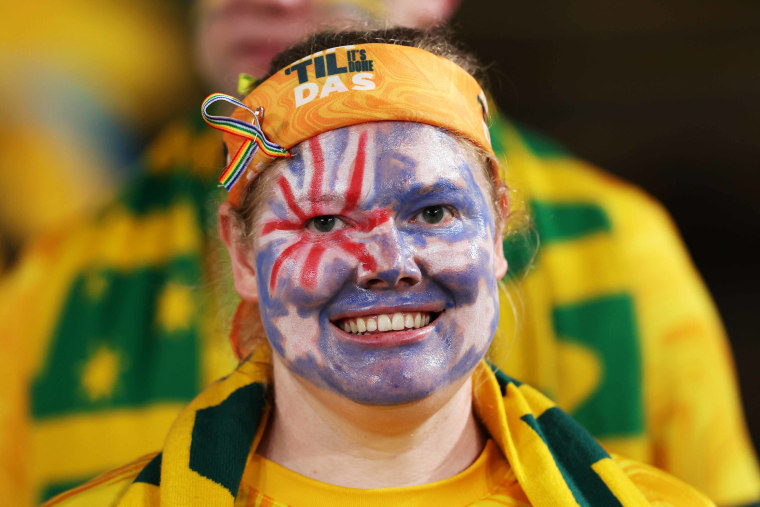SYDNEY — Nothing could compete with the Matildas.
Meetings were canceled. Other sporting events were rescheduled. Pubs stocked up, and viewing centers across the capital set up massive screens for the Matildas-obsessed masses.
When the Australian women’s national team, the Matildas, as they’re nicknamed here, took to the pitch Wednesday night (6 a.m. Wednesday ET) for their first World Cup semifinal against England, the country came to a screeching halt in front of its TVs. (Unless, of course, you were one of the lucky 80,000 fans packed into Stadium Australia in Sydney, one of the nine cities in Australia and New Zealand where the 2023 matches are being played.)
Hours before the match, fans dressed in the team’s green and gold were already gathering at the stadium, as well as at Tumbalong Park, where it was shown free on giant screens.
“It is putting these incredible women on center stage for them to, you know, play the best game of their lives,” Rayali Banerjee said outside the stadium before the match Wednesday.
Advancing out of the Women’s World Cup group stage sent a jolt through the sports-centric Australian psyche. And when the team fought past France in the longest penalty shootout in World Cup history, men’s or women’s, the entire country dared to dream.
The Matildas were unable to ride that wave of popular enthusiasm to victory, losing 3-1 to England in a tense match. But their legacy will surely endure.
“No national team has fused hopes and dreams so magically as the Matildas,” the front page of The Sydney Morning Herald proclaimed Wednesday before the match against England.
Another Australian broadsheet, The Daily Telegraph, changed its masthead to the “Tillygraph” as a nod to the team and included a shiny “Go Matildas” poster in every edition earlier this week.

The best run this women’s national soccer team has ever had in the World Cup was back in 2007, when it lost in the quarterfinals to Brazil. Sixteen years later, during the Matildas’ quarterfinal match Saturday against France, the Australian match announcer made an observation around the 72nd minute.
“This is the moment we stop calling it women’s football; it’s just football,” he said, adding, “This World Cup will go down in history as the moment it went mainstream.”
His fellow announcer added, “There is a seismic shift happening right now.”
Prime Minister Anthony Albanese backed calls by state and territory leaders for a public holiday had the Matildas gone on to win the tournament.
“This is something much more than just a sporting event,” he said in a radio interview Monday with state broadcaster ABC. “This is an inspiration to young girls in particular, but also young boys.”
By any metric, Australia is a sports-loving nation, but soccer is not at the core — rugby and Australian rules football have always been far more popular.
“The most exciting thing is when you actually see groups of men talking about it and there’s no women,” Sarah Prestwood said outside the stadium before the match Wednesday. “And it’s them talking about sport with the same passion that they would talk about football, meaning rugby, AFL or whatever.”
The country’s newfound love of women’s soccer is reminiscent of the U.S. in 1999, when the World Cup victory by the U.S. women’s national team — symbolized by Brandi Chastain’s ripping off her jersey after her winning goal — inspired national pride in the team and the sport. The U.S. remains the only World Cup host to win the women’s tournament.
The support for the women’s national team in Australia also contrasts with the backlash this year against the top-ranked U.S. team, which some back home criticized after a round-of-16 loss.

Australia’s Seven Network, the tournament’s official broadcaster here, reported a peak audience of 7.2 million people Saturday as Australia defeated France in a nail-biting 7-6 penalty shootout. Video of a planeload of people watching the shootout on their screens and erupting in applause at the moment of victory was widely viewed online.
The network said the quarterfinal match boasted an average of 4.17 million viewers, making it the most watched event on Australian television this year and the most watched sporting event in more than two decades.
The audience for the England match Wednesday was expected to obliterate that record.
Natalie Helm, whose daughter is 6, said it was moving to see the effect the team’s success has had on children: “Someone told us that they heard a little girl say to a boy, ‘What are the boy Matildas called?’”
